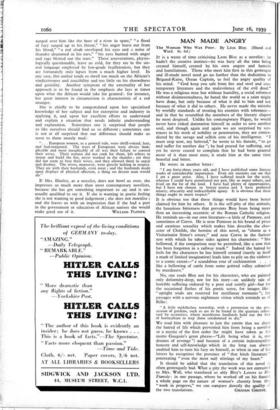MAN MADE ANGRY
IT is a waste of time criticising Leon Bloy as a novelist : he
hadn't the creative instinct—he was busy all the time being created himself, created by his own angers and hatreds and humiliations. Those who meet him first in this grotesque and ill-made novel need go no further than the dedication to Brigand-Kaire, Ocean Captain, to feel the angry quality of his mind. " God keep you safe from fire and steel and con- temporary literature and the malevolence of the evil dead." He was a religious man but without humility, a social reformer without disinterestedness, he hated the world as a saint might have done, but only because of what it did to him and not because of what it did to others. He never made the mistake by worldly standards of treating his enemies with tolerance— and in that he resembled the members of the literary cliques he most despised. Unlike his contemporary Peguy, he would never have risked damnation himself in order to save another soul, and though again and again we are surprised by sen- tences in his work of nobility or penetration, they are contra- dicted by the savage and selfish core of his intelligence. " I must stop now, my beloved," he wrote to his fiancee, " to go and suffer for another day "; he had prayed for suffering, and yet he never ceased to complain that he had been granted more of it than most men; it made him at the same time boastful and bitter.
He wrote in another letter :
" I am forty-three years old, and I have published some literary works of considerable importance. Even my enemies can see that I am a great artist. Also, I have suffered much for the truth, whereas I could have prostituted my pen, like so many others, and lived on the fat of the land. I have had plenty of opportunities, but I have not chosen to betray justice and I have preferred misery, obscurity and indescribable agony. It is obvious that these things ought to merit respect."
It is obvious too that these things would have been better claimed for him by others. It is the self-pity of this attitude, the luxurious bitterness that prevents Bloy from being more than an interesting eccentric of the Roman Catholic religion. He reminds us—in our own literature—a little of Patmore, and sometimes of Corvo. He is near Patmore in his brand of pious
and uxorious sexuality which makes him describe the char- acter of Clotilde, the heroine of this novel, as "chaste as a Visitationist Sister's rosary," and near Corvo in the furious zest with which he takes sides against his characters ; " She bellowed, if the comparison may be permitted, like a cow that
has been forgotten in a railway truck." Indeed the hatred he feels for the characters he has himself created (surely in itself a mark of limited imagination) leads him to pile on the violence to a comic extent—" a scandalous roar of cachinnation . . . like a bellowing of cattle from some goitred valley colonised by murderers."
No, one reads Bloy not for his characters, who are painted
only deformity-deep, nor for his story-an unlikely tale of horrible suffering endured by a poor and saintly girl—but for the occasional flashes of his poetic sense, for images like: " upright souls are reserved for rectilinear torments "; for passages with a nervous nightmare vision which reminds us of Rilke : " A little middleclass township, with a pretension to the pos- session of gardens, such as are to be found in the quarters colon- ised by eccentrics, where murderous landlords hold out the bait . of horticulture to trap those condemned to die."
We read him with pleasure to just the extent that we share the hatred of life which prevented him from being a novelist or a mystic of the first order (he might have taken as his motto Gauguin's great phrase—"Life being what it is, one dreams of revenge ") and because of a certain indestructible honesty and self-knowledge which in the long run always enabled him to turn his fury on himself, as when in one of his letters he recognises the presence of " that bitch literature " penetrating " even the most naif stirrings of my heart."
It should be added that the translation of this novel is often grotesquely bad. What a pity the work was not entrusted
to Mrs. Wall, who translated so ably Bloy's Letters to His Fiancée: in one passage, where he worked off on his fiancée a whole page on the nature of women's chastity from this " work in progress," we can compare directly the Quality of






















































 Previous page
Previous page